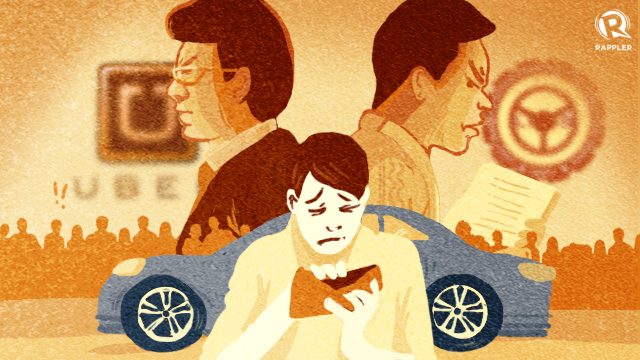SUMMARY
This is AI generated summarization, which may have errors. For context, always refer to the full article.

Of course people are mad. After several years of dependency on Uber and Grab as an alternative to our decrepit public transport system, recent events have rendered Metro Manila’s middle class commuters stranded – literally and figuratively.
Uber has been suspended by the LTFRB for defying an order to stop accrediting more drivers, leading patrons to take part in the newfound – and very pricey – bloodsport that is grabbing a super-surged Grab, or trudging along in Dickensian queues for trains, jeeps, and buses.
If you’ve long felt safe in the knowledge that you can get from Point A to B with the least amount of suffering, having that taken away from you can only make you feel cheated and wronged. On social media alone, just saying anything remotely negative towards ride sharing apps is a death wish; whole droves of netizens will shame you for even daring to think these apps are anything but a godsend. Moreover, the LTFRB has been cursed out and disparaged more than ever, labeled as enemies of technological progress.
What the madding crowd fails to acknowledge, however, is that this issue has more than one villain. We tend to take the good vs evil concept too simplistically, content with the idea that if one is bad (LTFRB), then the other must be good (Uber), and that at the end of this issue, only one must prevail. But let’s face it: as messed up as the LTFRB may be (and its incompetence, at this point, is well documented), Uber is also very much a culprit in this chaos.
It is one thing to disrupt the norm to do things better; it is a whole other thing to circumvent an order on the pretense of being a disruptor, and at the expense not only of frazzled commuters, but of Uber drivers and the loved ones they financially support.
Uber is not being hard-headed as some kind of power-to-the-people, Robin Hood-style derring-do. Uber kept accrediting drivers because it is a business, and its financial success depends on having as many drivers as possible plowing the streets. If Uber truly was interested in people’s wellbeing, as its marketing strongly suggests, then it would not have put the livelihoods of Uber drivers in danger.
Yes, these drivers are not technically under Uber’s employ the way employment is normally understood – a loophole that reveals disruption’s dark side – but the company is still willfully ignoring the fact that many of these drivers depend on the app as their sole source of income, and are putting these men and women on the chopping block ahead of themselves. Unfortunately, many Uber patrons gloss over the company’s bullheadedness and this brazen exploitation of technicalities, because it is all too easy to just focus on how the app benefits their commute in the short term.
If there is any party citizens should be siding with on this issue, then, it is neither the LTFRB nor Uber. It should be with the public. And the public is certainly not limited to middle class commuters who could afford to shell out a few hundred pesos a day to travel faster and more comfortably than others. Our energies would be far better directed not at idly demonizing a long-problematic agency, or defending a company that essentially sees us as bags of money, but at clamoring for an honest-to-goodness middle ground, where public transport is greatly augmented through sustainable, accessible tech.
If we continue to push for “solutions” that only benefit a fraction of the public, then we continue to be part of the problem. Yes, fixing the catastrophe that is the Metro Manila commute is easier said than done, but we have to suck it up and understand that addressing serious issues entails a lot of time and effort and cooperation. It is not going to be easy; that’s just how it is, and the sooner we accept this and get the process going, the sooner we can see results that actually help for the long haul.
The culture of disruption remains welcome, and clearly inevitable. But entities that thrive on it are neither foolproof nor absolute, and the last thing we need disrupted is our ability to call out bullshit when we see it. – Rappler.com
Add a comment
How does this make you feel?
There are no comments yet. Add your comment to start the conversation.